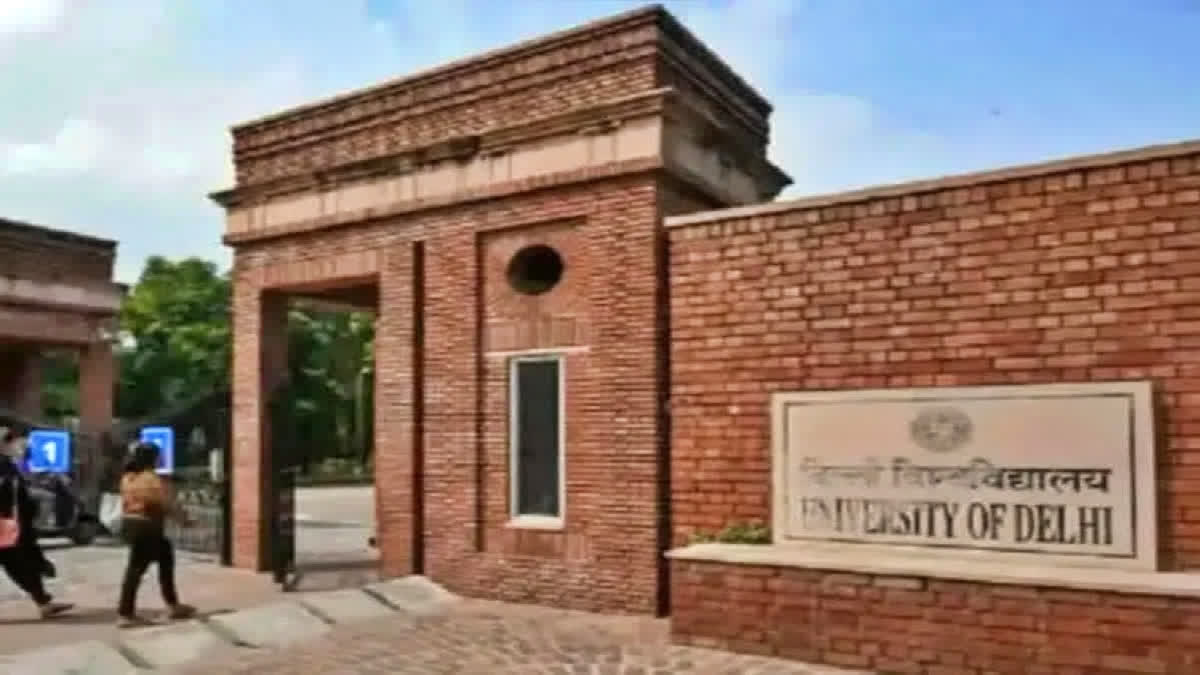New Delhi: Those who laid the foundation to break India should not be in the syllabus, Delhi University Vice Chancellor Yogesh Singh said after the academic council passed a motion to remove a chapter on Pakistan's national poet Muhammad Iqbal from the political science curriculum. Born in 1877 in Sialkot in undivided India, Iqbal had written the famous song 'saare jahan se achha'. He is often credited with giving birth to the idea of Pakistan.
The university's academic council in a meeting on Friday had passed a motion for the removal of the chapter titled 'Modern Indian Political Thought'. It is part of the BA sixth-semester paper, officials said, adding that the matter will now be presented before the executive council of the Delhi University (DU) for a final call.
Vice Chancellor Singh said Iqbal wrote songs supporting the "Muslim League" and the "Pakistan Movement". "Iqbal was the first to raise the idea of partition of India and the establishment of Pakistan. Instead of teaching such people, we should study our national heroes. Those who laid the foundation to break India should not be in the syllabus," the vice chancellor (VC) said, according to a DU statement issued after the nearly 15-hour-long meeting that began 10:30 am on Friday.
The university said the VC's proposal was unanimously passed by the academic council. In the meeting that ended around 1:20 am on Saturday, the syllabus for the fourth, fifth and sixth semesters of various courses under the Undergraduate Curriculum Framework (UGCF) 2022 was passed, it said.
The meeting also considered the recommendations of the standing committee regarding the course of BA proposed by the philosophy department, and approved them unanimously with the head of the department being in agreement, the university said. The BA courses offered by the philosophy department include "Philosophy of Dr Ambedkar", "Philosophy of Mahatma Gandhi" and "Philosophy of Swami Vivekananda".
In addition, the VC requested the head of philosophy department to explore the possibility of including Savitribai Phule in the curriculum, DU said. Singh also advised the head of the economics department, Delhi School of Economics, to prepare a paper on the economic thoughts of Dr BR Ambedkar. He said that the Indian Economic Model, US Model and European Model should be taught.
During the meeting, three new programmes of B.Tech by the Faculty of Technology were approved and these will start from the academic session 2023-2024. The academic council also gave its nod to Udmoday Foundation's "University of Delhi Innovation and Startup Policy". Programmes of B.Tech computer science and engineering, B.Tech electronics and communication engineering and B.Tech electrical engineering will be started.
The university said apart from these, the council also approved proposals to start two new five-year LLB courses and set up the Center for Independence and Partition Studies. Through research, this centre will work on such unknown heroes and events of the freedom movement, which have not yet found a place in history, the DU said.
The incidents during the tragedy of the Partition of India will also be deeply studied and researched, it said and added that for this, "oral history" will also be recorded in the voices of those people of that era who have suffered this tragedy. Studies will also be done in this centre to fully understand the challenges faced in achieving independence from foreign rule and the impact of physical, emotional, economic and cultural loss on the people due to the geographical division of the country, the university said.
The centre will work on the study of various aspects of the struggle for independence and the causes and effects of the Partition. In the meeting, the establishment of a Tribal Studies Center was also approved. It will be a multi-disciplinary centre with studies on various tribes of the country. The main objectives of the centre are to understand the term "tribe" from an Indo-centric perspective, to study their social, cultural, linguistic, religious, economic, environmental aspects and to study the role and contribution of tribal leaders in different eras of India, the DU said.
The centre also aims to shed light on the role and importance of tribal leaders in India's freedom struggle, to bring to the fore the unsung heroes among them, to study and document the various folk traditions prevalent among the tribes, it said. The academic council also approved the Integrated Teacher Education Program (ITEP) course from the academic session 2023-24. This will be a four-year course as a pilot project.
Talking about it, the VC said, "This will not have any impact on the teacher education programmes going on earlier. No course will be closed." He said this course will be conducted after senior secondary or its equivalent examination or according to the National Education Policy-2020 structure of school education (5+3+3+4).
Six members of the academic council dissented against the resolution, saying there was no consultation in this regard with the teachers. "It is unfortunate that ITEP has been passed despite the dissent of the members. We will continue our fight to safeguard the interests of stakeholders," academic council elected member Maya John told PTI. John was part of a group of members who dissented against the resolution.
In the dissent notes, members have argued that the Committee of Courses and Faculty of Education have been completely bypassed in bringing the NCTE notification on ITEP directly to the council. In the zero-hour, a section of academic council members raised a slew of issues, including those related to displaced temporary and ad hoc teachers.
The members also protested against a Delhi University notification asking colleges to remain open from 8 am to 8 pm without any discussion with the academic and executive councils. (PTI)



